- Home
- J. Clifton Slater
Muted Implications (Clay Warrior Stories Book 12) Page 15
Muted Implications (Clay Warrior Stories Book 12) Read online
Page 15
“Ponies, lots of ponies passed this way,” Culni pointed out the hoof prints in the soil.
“And pack mules,” Messia added. “Those are not the tracks of a casual hunting party.”
“I believe we have found our missing tribesmen,” Culni concluded. “What’s the call?”
“If we go back, the Latin commanders will pat us on the head,” Messia responded, “for locating our brethren.”
“On the other hand, if we return with details,” Culni picked up the thought, “Legion command will reward us.”
“Generously,” Messia concluded. “Who is going in?”
“We have to find their camp first,” Culni advised.
“That, noble Etruscan Auxiliary Scout,” Messia teased his partner while pointing a finger at the tracks, “is not the problem.”
They nudged their mounts up the grade heading for the tree line.
***
With shadows growing long in the forest, Messia hiked the trail. He strutted around a bend and abruptly stopped.
“What are you?” an Etruscan spearman demanded.
At a campfire, three other men sat watching the exchange. The Legion scout tapped his lips with a finger while pondering the question.
“A son, a farmer, a hunter,” Messia described. “And sometimes, a lover. An extraordinary ladies’ man to be honest.”
The men at the campfire chuckled.
“Not what are you?” the sentry corrected. “Who are you?”
“I am an Etruscan whose pony fell off a high trail,” Messia lied. “It was too far down. To steep and deep for me to climb down and retrieve my wineskin. Do you have any wine?”
“Stay on the path,” the spearman instructed. “Move on.”
“I haven’t had a ruder conversation since last week,” Messia whined to the guard, “since the headman at my village scolded me for talking to his daughter.”
“Keep moving,” the warrior urged.
“He had nothing to worry about,” Messia added as he moved out of jabbing distance of the spear, “she’s as ugly as a week-old carp on the eighth day. All skin and bones.”
The sentry and his three companions laughed at the harmless tribesman.
***
Where the path ended, the forest opened to a large clearing. Messia assumed a weary pace and headed for the largest tent. As he walked, he counted smaller tents. Figuring two men per tent, he concluded the clearing held over five hundred warriors.
“What are you doing?” he whispered.
“What did you say?” a pair of Etruscans asked.
“Brothers, I am pony less and wineless,” Messia declared, “but I am not coinless. I am heading for the big tent to rectify both of my shortcomings.”
The warriors exchanged glances then, both swung fists at Messia’s face. Ducking to avoid the surprise attacks, the scout pounded one of the men in the groin. Following the punch, he leaned to the side, jumped up, and powered forward. The top of his head caught the second warrior under the jaw. While the impact jolted Messia, it snapped the attacker’s head back. He collapsed to the ground next to his partner in crime.
“That, my brothers, was not Etruscan hospitality,” Messia scolded. Before resuming his trip to the big tent, he kicked both men in the neck and added. “Never stand between a thirsty man and his wine.”
The scuffle and its rapid conclusion had drawn a crowd. One of the observers stood at the entrance to the big tent.
“Chief, do you have enough wine for a man to purchase a skin,” Messia asked flashing a slightly off-center smile at the man. “And maybe an extra pony you would part with for a fair price?”
“I might if you can explain that,” the headman said while indicating the two warriors moaning on the ground.
“Ah, the fighting?” Messia acknowledged. “In my youth I confess, I frequented establishments with low moral standards. I would like to say it was out of ignorance. But truthfully, it was the low price of their wine.”
“What does that have to do with you beating two of my best fighters?” the chief inquired.
“Those thieves?” Messia questioned. “They are nothing compared to the cut throats and brawlers frequenting the evil pubs of my youth. Do you have wine?”
“Do you have coins?” the chief asked. “And a name?”
“My name is Messia. My coins are made of good Etruscan metal,” the Legion scout bragged, “not that Latian tin.”
The men around them laughed.
“Pevtha,” the headman called to the crowd.
“Someone else I have to fight?” Messia guessed.
“No, he is my good right hand,” the chief replied.
He held up his right hand. Two fingers were clearly cut off, leaving only a thumb, the little, and the forefinger. In a glance, Messia knew the headman could not hold a sword or a spear or pull a bow.
“Eutropius, I am here,” a big man answered. He pushed his way through the crowd. “What do you want, Chief?”
“Messia here needs a pony, a spear, and wine,” Eutropius ordered.
“Why a spear?” Messia inquired.
“Because you have joined my army,” Eutropius declared. “Go select a war pony. When the messenger from Rome arrives, we ride to kill Latians.”
***
Sunset dropped as if a new curtain and, the forest deepened with the night. Messia waited for the tribesmen to settle around the campfires.
“I’m going to check on my pony,” he announced while standing.
“You like him?” Pevtha inquired.
“He is a fine animal and I want him to get to know me,” Messia replied. He took two steps towards the animal area, spun on his heels, and returned to the fire. “Almost forgot the wineskin.”
With the pouch of wine slung over a shoulder, Messia staggered away.
“We’ll not see him at the fire tonight,” Pevtha declared to the other Etruscans. “He’ll probably sleep on the ground next to the ponies.”
“It’ll be cold tonight,” one warned. “Shouldn’t we collect him later.”
“No. Leave him to his own failings,” Pevtha instructed. “The wine will keep him warm.”
Messia squatted just beyond the circle of light. Once sure he would be ignored until morning, the Legion scout crept across the encampment. On the trail at the edge of the clearing, he stood straighter but zigzagged as he walked.
“Find your wine?” the warrior on duty at the check point asked.
The three at the fire perked up at the arrival.
“Yes, a good-natured soul had an extra,” Messia slurred. He patted the wineskin. “But, no one would lend me…ah, I found no companionship. Or anyone who would part with a pony.”
“You mean they had guards watching the livestock,” the sentry speculated. “Move along. We have to guard this trail. But we don’t have to invite you to our campfire and guard against you stealing our possessions.”
“Allow me, this time,” Messia offered. “Move along.”
The Legion scout staggered by the sentry position, continued around the curved trail, and vanished into the dark.
***
Once out of hailing distance from the sentry post, Messia straightened his stride and shrugged the wineskin off his shoulder.
“Want a drink,” he called into the forest.
A figure emerged from the trees and guided two ponies onto the trail.
“It is cold,” Culni exclaimed while taking the wineskin and handing one of the reins to Messia. “So, they are a small family hunting party.”
“Big family, five hundred plus strong,” Messia stated while they walked their ponies through the dark. “And it seems a relative is coming from the Capital of the Republic to take them on a tour.”
“I believe Senior Tribune Claudius will be interested in that news,” Culni remarked.
“As will the Legion paymaster,” Messia reckoned.
***
“Sir, we can handle this,” the Senior Centurion affirmed for Gaius.
“A thousand heavy infantrymen, a couple Centuries of light, plus cavalry should persuade the Etruscans to disperse.”
Senior Tribune Claudius moved a finger over a map. Back and forth he traced the paths between his garrison locations and the Berignone Forest.
“And we trust the scouts who claim to know exactly where the war party is camped?” Gaius questioned.
“Sir, they want a chance at citizenship,” the Centurion told him. “Between the cash reward and the accolades, they won’t lie.”
“Let’s get some air,” Gaius suggested.
The two senior officers for the Northern Legion stepped onto the veranda of the Legion fort.
“Senior Centurion, I am leaving the Legion in your hands,” Gaius explained. “The Central Legion needs to know about the Etruscan gathering and I have social commitments in Rome.”
Noting the illumination from the sky, the Centurion pointed out, “The moon is rising. It’s a new day, sir.”
Gaius Claudius stared at the moon for a few moments before adding, “That means it’s three days before the Ides of March.”
Chapter 22 – War and Determination
If asked, Lucius Valerius Flaccus would swear he only rested his eyes for a moment. But during that time, the rain stopped, and the skies cleared. The servants and his assistant worked silently to keep the rented house quiet so the Senator could rest and not worry.
The serenity was broken by the wheels of a transport wagon and a carriage crushing gravel in the villa’s courtyard and three horses stomping and bowing hard.
“What is the meaning of this?” Flaccus’ secretary demanded.
“My apologies,” the transport driver stated. “Compliments of Centurion Rudentis. He advised that if the Senator so desires, the warship is available for launch as soon as the Senator is on board.”
“You stay right there,” the assistant ordered. Then to the household staff. “Load what we have packed. Everything else can be sent along later.”
He rushed to the office to alert the Senator.
***
“Neptune, God of the sea, we beseech you for mercy during our travels over your domain,” ship’s Centurion Rudentis called in the direction of the mouth to Messina harbor. “Keep the seas calm, the monsters in their depths, and the birds flying along our route. For a safe voyage from sheltered harbor to sheltered harbor, we give you thanks.”
The warship’s senior officer cut a chicken and allowed the blood to drip into the water.
“Stow this one away,” he instructed handing the sacrificed bird to the Third Principale. Then he noticed the arrival of the carriage and the transport. “Stand by to launch.”
“Oarsmen. Beach detail fall in,” the ship’s third deck officer ordered. He handed the bird to the ship’s carpenter. “Rowers, to your stations.”
Ninety oarsmen circled the hull on the beach and another ninety climbed to their oars.
“First Principale, take your sailors and help with the luggage,” Rudentis directed while searching the sky. “We can cross the strait and be twenty miles up the coast before dark. If we launch quickly and those clouds remain dry.”
“Yes, sir,” the first deck officer acknowledged.
While he gathered the sailors to help unload the transport wagon, the ship’s Centurion waved over the second deck officer and the ship’s musician.
“We are making a speed run to Ostia,” he counseled the rowing officer and the drummer. “No pipes. If the wind fails us, I want backs bent over oars, rowing to a rapid stroke beat. Do I make myself understood?”
“Yes, sir,” they both responded.
The Second Principale vanished down to the rowers walk to motivate and warn the oarsmen already at their oars. Unlashing the cover, the ship’s musician peeled the waxed leather off his drumhead. Once ready, he carried it to midship and tested the sound with four taps. In response, ninety rowers answered back by knocking their oars against the wooden interior.
Centurion Rudentis faced the ramp and braced.
“Senator Flaccus, welcome aboard the Republic warship Muta's Death,” Rudentis said while saluting the dignitary. “We will push off as soon as your luggage in stowed.”
“Is this advisable, Centurion?” Flaccus questioned. “There are heavy clouds in the sky.”
“As long as they remain up there, we have clear rowing,” Rudentis advised the Senator. “First Principale, get us wet.”
The first deck officer shouted down to the third.
“Third Principale, launch the warship.”
The trireme shifted before the hull ground on the sand. Then, it bobbed as the bronze ram dipped before coming level.
“Second Principale run out the oars,” the first deck officer shouted.
Ninety oarsmen climbed onto the deck. While some took the ladder down to the rowers walk, most dropped through the split in the top deck to reach their stations. The last man up ran to the foredeck and searched the waters of the harbor.
“All clear ahead,” the third deck officer reported.
“Musician, set a slow tempo,” the First Principale instructed.
Below deck, the second deck officer strolled the rowers walk to his Bow rowers to be sure the lightest of his oarsmen had the rhythm. Then he moved back to check on the powerful rowers of his Engine and, finally, he made a cursory stop at his Stroke in the aft section. Although, his best rowers required little supervision.
Muta's Death glided across the smooth water of the harbor. At the mouth and just before the warship entered the changing waters of the Messina strait, Centurion Rudentis made a fist and punched forward.
“First Principale, stroke us across,” he ordered.
“Second Principale, stand by for a rapid rate,” the first deck officer called down to the rowers walk.
“Standing by,” the response came from below deck.
“Musician set a rapid rate,” the first deck officer instructed.
A note from the drum was followed by ninety oars dipping and splashing. On the second drumbeat, the oars hit the water almost as one. Then the beats increased, and the oars matched the rhythm.
The warship, named for the Goddess of Silence, lifted slightly as the trireme skated across the churning waters of the Messina strait. On the far side, Muta's Death changed to a northern heading and started up the coast of the Republic’s territory.
Once out of rough waters, the sails were unrolled, and the rowers rested.
***
“Notus has blessed us,” one of the navigators on the rear oars observed.
“But Sol Indiges is ready to retire for the day,” Rudentis responded. “Hopefully, we’ll have the God of the Southern Wind with us again tomorrow. First Principale, roll the sails and prepare to beach.”
“Second Principale, raise the sails and run out the oars,” the first deck officer instructed the second officer.
A short while later, Muta's Death nosed around until the ram faced the sea.
“Backstroke,” the orders were passed.
After several strokes, the first deck officer called out.
“Third Principale make us high and dry.”
While the beaching crew jumped overboard to push the warship up on the shoreline, ship’s Centurion Rudentis peered across the darkening deck at his important passenger.
“Senator Flaccus. The crew is preparing a feast and you are the guest of honor,” Rudentis stated. “A few words would be appreciated.”
“Your crew and officers are all citizens of the Republic?” Flaccus inquired.
“Yes, sir. From every region but, citizens all,” the Centurion confirmed.
“Then it will be my pleasure,” the Senator replied.
***
Sixty-five campfires blazed and, at each fire, chickens rotated on spits. While the birds cooked, pots on tripods just above the flames heated vegetables.
“Crew of the silent and deadly warship Muta's Death,” Ship's Centurion Rudentis announced. He waited until the cheering f
ell off. “We have been handed a task fit for ancient heroes. To give us heart for the days ahead, I present Lucius Valerius Flaccus, former Consul and sitting Senator of our Republic.”
Flaccus stepped behind a campfire so he was lit for everyone to see his face and the clothing he wore. Then he raised his arms and spread his fingers. In the dramatic pose, the Senator walked to stand in front of the fire. From a man, he transformed to a mysterious black shape. And when his fingers wiggled, and the arms rocked from side to side it seemed he was blown by an unfelt wind. The crew sat straighter and focused on the Senator.
"Between death and pain, between a rock and a hard place, to choose between the lesser of two evils, is an everyday occurrence for men who go to sea,” Lucius Flaccus started his speech. “You are sailors. Men who venture out in vessels made of brittle sticks. No offence to the ship’s carpenter.”
Many of the rowers called to the carpenter for being singled out by a famous man.
“Wood can shatter in storms, crack on rocks, break in war, yet, it is your weapon of choice and the steed on which you ride into battle,” Flaccus explained. “Each time a man chooses between dangerous extremes, providence tells us, the inevitable is disaster.”
The silhouette of the arms stopped waving and the fingers formed fists.
“But you the crew of the Muta's Death resist the fates,” the Senator boomed. He cocked his raised his arms, leaned to the right, and with two fingers on each fist pointed to the campfires on the right side. “Just this afternoon, you piloted this warship over the strait of Messina. On one side, the rocky shallows of Scylla waited for any ship that faltered.”
The arms floated to the extreme left and indicated the campfires on that side.
“But, did you hesitate when the rocks called to your fragile wooden ship?” Flaccus questioned. “No. You rowed with stout hearts, never weakening or vacillating.”
Roars of approval burst from the crew and washed over the Senator. The raised arms shot straight ahead, and the fingers specified the campfires in the middle.
“And still you rowed to the far side of the Messina strait. There another bad idea waited for Muta's Death, the whirlpool of Charybdis. From the beginning of sea travel, Charybdis has gripped less than perfectly rowed ships. And once in the grip of the whirlpool, weaker wooden vessels with timid crews spun around and around and around. But did Muta's Death go down?”

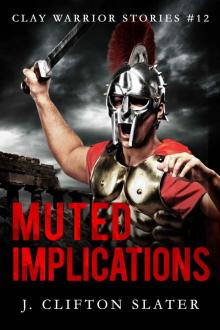 Muted Implications (Clay Warrior Stories Book 12)
Muted Implications (Clay Warrior Stories Book 12)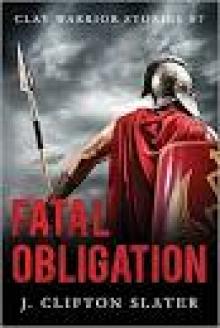 Fatal Obligation
Fatal Obligation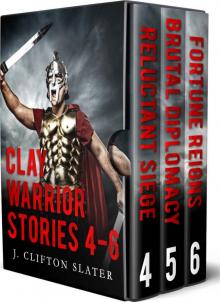 Clay Warrior Stories Boxset 2
Clay Warrior Stories Boxset 2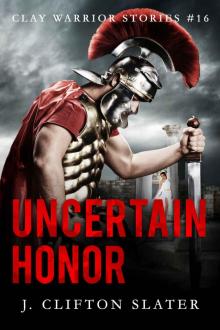 Uncertain Honor
Uncertain Honor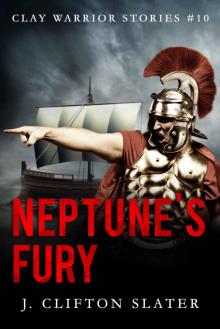 Neptune's Fury
Neptune's Fury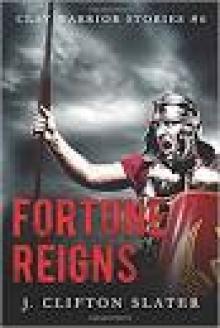 Fortune Reigns
Fortune Reigns Op File Treason
Op File Treason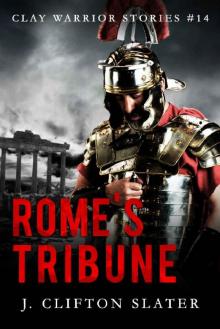 Rome's Tribune (Clay Warrior Stories Book 14)
Rome's Tribune (Clay Warrior Stories Book 14)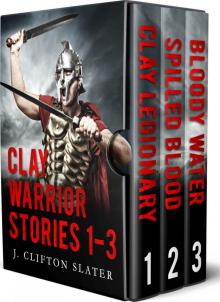 Clay Warrior Stories Boxset 1
Clay Warrior Stories Boxset 1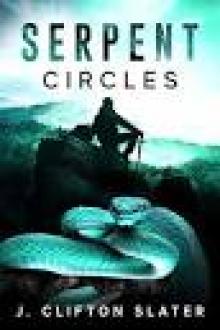 Serpent Circles
Serpent Circles Reluctant Siege
Reluctant Siege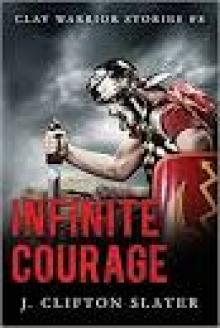 Infinite Courage
Infinite Courage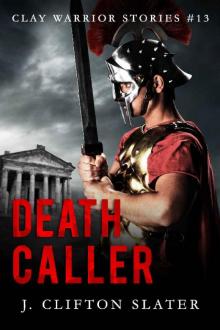 Death Caller (Clay Warrior Stories Book 13)
Death Caller (Clay Warrior Stories Book 13) Op File Sanction
Op File Sanction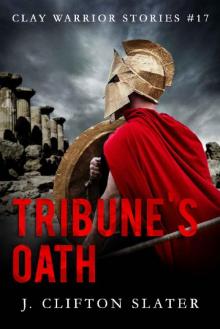 Tribune's Oath (Clay Warrior Stories Book 17)
Tribune's Oath (Clay Warrior Stories Book 17)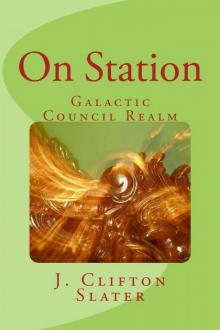 Galactic Council Realm 1: On Station
Galactic Council Realm 1: On Station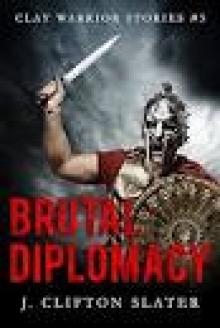 Brutal Diplomacy
Brutal Diplomacy Op File Revenge
Op File Revenge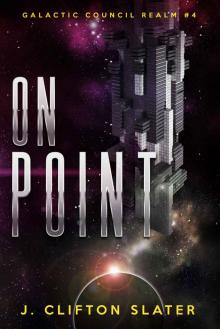 On Point
On Point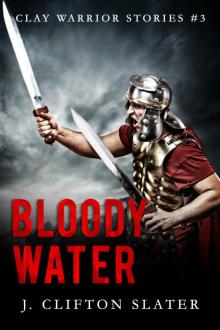 Bloody Water (Clay Warrior Stories Book 3)
Bloody Water (Clay Warrior Stories Book 3)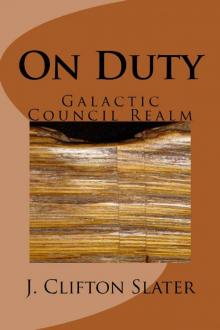 Galactic Council Realm 2: On Duty
Galactic Council Realm 2: On Duty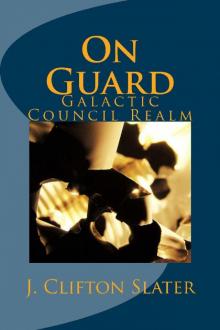 Galactic Council Realm 3: On Guard
Galactic Council Realm 3: On Guard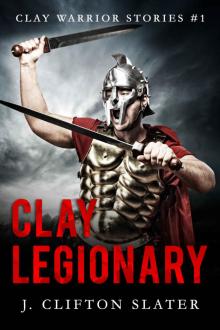 Clay Legionary (Clay Warrior Stories Book 1)
Clay Legionary (Clay Warrior Stories Book 1)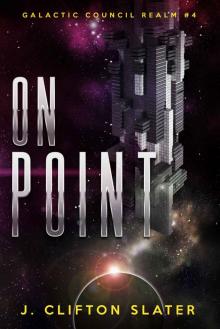 On Point (Galactic Council Realm Book 4)
On Point (Galactic Council Realm Book 4) Op File Revenge (Call Sign Warlock Book 1)
Op File Revenge (Call Sign Warlock Book 1)